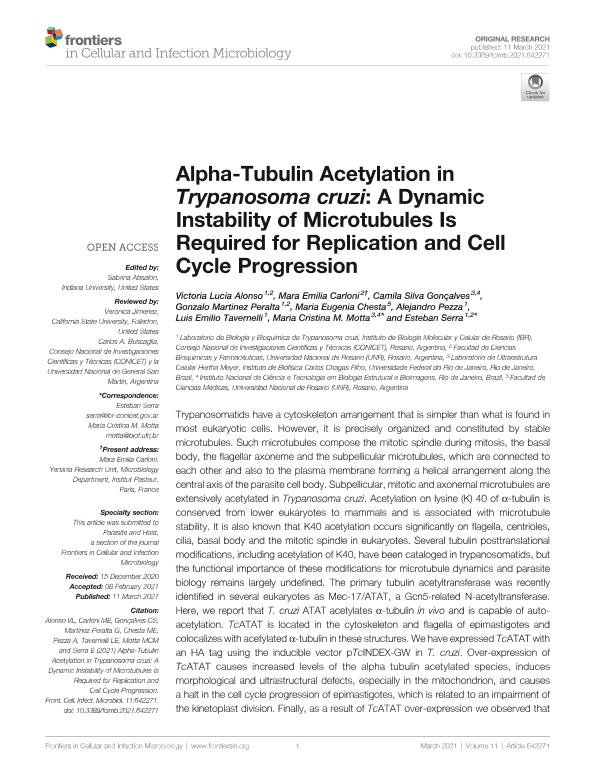Mostrar el registro sencillo del ítem
dc.contributor.author
Alonso, Victoria Lucia

dc.contributor.author
Carloni, Mara Emilia
dc.contributor.author
Silva Goncalves, Camila
dc.contributor.author
Martinez Peralta, Gonzalo

dc.contributor.author
Chesta, María Eugenia

dc.contributor.author
Pezza, Alejandro

dc.contributor.author
Tavernelli, Luis Emilio

dc.contributor.author
Motta, Maria Cristina M.
dc.contributor.author
Serra, Esteban Carlos

dc.date.available
2023-01-26T10:45:25Z
dc.date.issued
2021-03
dc.identifier.citation
Alonso, Victoria Lucia; Carloni, Mara Emilia; Silva Goncalves, Camila; Martinez Peralta, Gonzalo; Chesta, María Eugenia; et al.; Alpha-Tubulin Acetylation in Trypanosoma cruzi: A Dynamic Instability of Microtubules Is Required for Replication and Cell Cycle Progression; Frontiers Media; Frontiers in Cellular and Infection Microbiology; 11; 3-2021; 1-17
dc.identifier.issn
2235-2988
dc.identifier.uri
http://hdl.handle.net/11336/185647
dc.description.abstract
Trypanosomatids have a cytoskeleton arrangement that is simpler than what is found in most eukaryotic cells. However, it is precisely organized and constituted by stable microtubules. Such microtubules compose the mitotic spindle during mitosis, the basal body, the flagellar axoneme and the subpellicular microtubules, which are connected to each other and also to the plasma membrane forming a helical arrangement along the central axis of the parasite cell body. Subpellicular, mitotic and axonemal microtubules are extensively acetylated in Trypanosoma cruzi. Acetylation on lysine (K) 40 of α-tubulin is conserved from lower eukaryotes to mammals and is associated with microtubule stability. It is also known that K40 acetylation occurs significantly on flagella, centrioles, cilia, basal body and the mitotic spindle in eukaryotes. Several tubulin posttranslational modifications, including acetylation of K40, have been cataloged in trypanosomatids, but the functional importance of these modifications for microtubule dynamics and parasite biology remains largely undefined. The primary tubulin acetyltransferase was recently identified in several eukaryotes as Mec-17/ATAT, a Gcn5-related N-acetyltransferase. Here, we report that T. cruzi ATAT acetylates α-tubulin in vivo and is capable of auto-acetylation. TcATAT is located in the cytoskeleton and flagella of epimastigotes and colocalizes with acetylated α-tubulin in these structures. We have expressed TcATAT with an HA tag using the inducible vector pTcINDEX-GW in T. cruzi. Over-expression of TcATAT causes increased levels of the alpha tubulin acetylated species, induces morphological and ultrastructural defects, especially in the mitochondrion, and causes a halt in the cell cycle progression of epimastigotes, which is related to an impairment of the kinetoplast division. Finally, as a result of TcATAT over-expression we observed that parasites became more resistant to microtubule depolymerizing drugs. These results support the idea that α-tubulin acetylation levels are finely regulated for the normal progression of T. cruzi cell cycle.
dc.format
application/pdf
dc.language.iso
eng
dc.publisher
Frontiers Media

dc.rights
info:eu-repo/semantics/openAccess
dc.rights.uri
https://creativecommons.org/licenses/by-nc-sa/2.5/ar/
dc.subject
ACETYLATION
dc.subject
CELL DIVISION
dc.subject
CYTOSKELETON
dc.subject
FLAGELLA
dc.subject
TUBULIN (MICROTUBULES)
dc.subject.classification
Biología Celular, Microbiología

dc.subject.classification
Ciencias Biológicas

dc.subject.classification
CIENCIAS NATURALES Y EXACTAS

dc.title
Alpha-Tubulin Acetylation in Trypanosoma cruzi: A Dynamic Instability of Microtubules Is Required for Replication and Cell Cycle Progression
dc.type
info:eu-repo/semantics/article
dc.type
info:ar-repo/semantics/artículo
dc.type
info:eu-repo/semantics/publishedVersion
dc.date.updated
2022-09-19T16:04:11Z
dc.journal.volume
11
dc.journal.pagination
1-17
dc.journal.pais
Estados Unidos

dc.description.fil
Fil: Alonso, Victoria Lucia. Consejo Nacional de Investigaciones Científicas y Técnicas. Centro Científico Tecnológico Conicet - Rosario. Instituto de Biología Molecular y Celular de Rosario. Universidad Nacional de Rosario. Facultad de Ciencias Bioquímicas y Farmacéuticas. Instituto de Biología Molecular y Celular de Rosario; Argentina
dc.description.fil
Fil: Carloni, Mara Emilia. Universidad Nacional de Rosario; Argentina
dc.description.fil
Fil: Silva Goncalves, Camila. Universidade Federal do Rio de Janeiro; Brasil
dc.description.fil
Fil: Martinez Peralta, Gonzalo. Consejo Nacional de Investigaciones Científicas y Técnicas. Centro Científico Tecnológico Conicet - Rosario. Instituto de Biología Molecular y Celular de Rosario. Universidad Nacional de Rosario. Facultad de Ciencias Bioquímicas y Farmacéuticas. Instituto de Biología Molecular y Celular de Rosario; Argentina
dc.description.fil
Fil: Chesta, María Eugenia. Universidad Nacional de Rosario. Facultad de Ciencias Médicas; Argentina. Consejo Nacional de Investigaciones Científicas y Técnicas; Argentina
dc.description.fil
Fil: Pezza, Alejandro. Consejo Nacional de Investigaciones Científicas y Técnicas. Centro Científico Tecnológico Conicet - Rosario. Instituto de Biología Molecular y Celular de Rosario. Universidad Nacional de Rosario. Facultad de Ciencias Bioquímicas y Farmacéuticas. Instituto de Biología Molecular y Celular de Rosario; Argentina
dc.description.fil
Fil: Tavernelli, Luis Emilio. Consejo Nacional de Investigaciones Científicas y Técnicas. Centro Científico Tecnológico Conicet - Rosario. Instituto de Biología Molecular y Celular de Rosario. Universidad Nacional de Rosario. Facultad de Ciencias Bioquímicas y Farmacéuticas. Instituto de Biología Molecular y Celular de Rosario; Argentina
dc.description.fil
Fil: Motta, Maria Cristina M.. Universidade Federal do Rio de Janeiro; Brasil
dc.description.fil
Fil: Serra, Esteban Carlos. Consejo Nacional de Investigaciones Científicas y Técnicas. Centro Científico Tecnológico Conicet - Rosario. Instituto de Biología Molecular y Celular de Rosario. Universidad Nacional de Rosario. Facultad de Ciencias Bioquímicas y Farmacéuticas. Instituto de Biología Molecular y Celular de Rosario; Argentina
dc.journal.title
Frontiers in Cellular and Infection Microbiology
dc.relation.alternativeid
info:eu-repo/semantics/altIdentifier/url/https://www.frontiersin.org/articles/10.3389/fcimb.2021.642271/full
dc.relation.alternativeid
info:eu-repo/semantics/altIdentifier/doi/http://dx.doi.org/10.3389/fcimb.2021.642271
Archivos asociados
